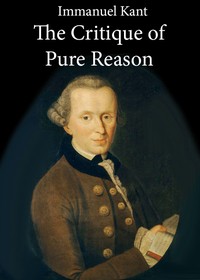The Critique of Pure Reason by Immanuel Kant
"The Critique of Pure Reason" by Immanuel Kant is a foundational philosophical text written during the late 18th century. This critically important work examines the limits and scope of human understanding and knowledge, especially focusing on metaphysics and the distinction between a priori (knowledge independent of experience) and a posteriori (knowledge dependent on experience) cognitions. The opening of the book introduces Kant's ambitious project of critically analyzing the capabilities of reason itself.
He establishes that while all knowledge begins with experience, a portion of it can exist independently of experience. Kant delves into the significance of pure a priori knowledge, proposing that certain cognitive faculties allow humans to form necessary and universal judgments that are not derivable from empirical observation. He outlines a systematic approach toward metaphysics which, instead of making unfounded assertions, should investigate the very nature and limits of our reason, establishing a solid epistemological foundation before attempting any metaphysical inquiry. (This is an automatically generated summary.)
Read or download for free
| How to read | Url | Size | |||
|---|---|---|---|---|---|
| Read now! | https://www.gutenberg.org/ebooks/4280.html.images | 1.3 MB | |||
| EPUB3 (E-readers incl. Send-to-Kindle) | https://www.gutenberg.org/ebooks/4280.epub3.images | 617 kB | |||
| EPUB (older E-readers) | https://www.gutenberg.org/ebooks/4280.epub.images | 635 kB | |||
| EPUB (no images, older E-readers) | https://www.gutenberg.org/ebooks/4280.epub.noimages | 501 kB | |||
| Kindle | https://www.gutenberg.org/ebooks/4280.kf8.images | 949 kB | |||
| older Kindles | https://www.gutenberg.org/ebooks/4280.kindle.images | 918 kB | |||
| Plain Text UTF-8 | https://www.gutenberg.org/ebooks/4280.txt.utf-8 | 1.3 MB | |||
| Download HTML (zip) | https://www.gutenberg.org/cache/epub/4280/pg4280-h.zip | 585 kB | |||
| There may be more files related to this item. | |||||
About this eBook
| Author | Kant, Immanuel, 1724-1804 |
|---|---|
| Translator | Meiklejohn, J. M. D. (John Miller Dow), 1830-1902 |
| Title | The Critique of Pure Reason |
| Note | Wikipedia page about this book: https://en.wikipedia.org/wiki/Critique_of_Pure_Reason |
| Note | Reading ease score: 35.3 (College-level). Difficult to read. |
| Credits | Charles Aldarondo and David Widger |
| Language | English |
| LoC Class | B: Philosophy, Psychology, Religion |
| Subject | Knowledge, Theory of |
| Subject | Causation |
| Subject | Reason |
| Subject | Philosophy, German |
| Category | Text |
| EBook-No. | 4280 |
| Release Date | Jul 1, 2003 |
| Most Recently Updated | Jul 26, 2021 |
| Copyright Status | Public domain in the USA. |
| Downloads | 9093 downloads in the last 30 days. |
| Project Gutenberg eBooks are always free! | |

